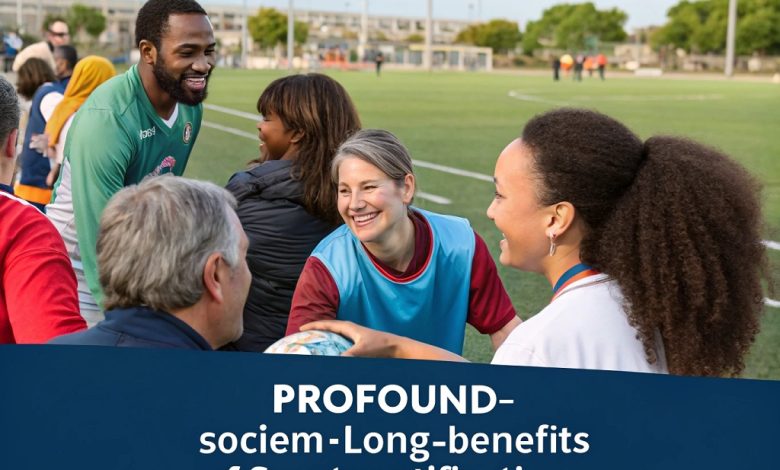The Profound Social Benefits of Long-Term Sports Participation

In a world increasingly dominated by screens and sedentary lifestyles, the importance of physical activity cannot be overstated. While the health benefits of sports are widely acknowledged, the social advantages often remain underappreciated. Long-term participation in sports, from childhood through adulthood, fosters a rich tapestry of social skills, community connections, and personal growth. This article delves into the multifaceted social benefits that emerge from sustained engagement in athletic pursuits, exploring how sports cultivate not just physical prowess, but also a stronger, more connected society.

Building Robust Social Networks and Community Bonds
Sports inherently create a shared experience, a common ground where individuals from diverse backgrounds converge. Whether it’s a local soccer league, a weekly basketball game, or a community running club, these settings facilitate the development of strong social bonds. The camaraderie forged on the field or court extends beyond the game itself, translating into lasting friendships and supportive networks.
- Shared Experiences: The highs and lows of competition, the collective effort towards a common goal, and the shared sense of achievement create powerful bonds among teammates. These experiences foster a sense of belonging and community, reducing feelings of isolation and promoting social cohesion.
- Intergenerational Connections: Sports can bridge generational gaps, bringing together individuals of varying ages and life experiences. Older participants often mentor younger ones, sharing their wisdom and experience, while younger participants inject energy and enthusiasm into the group. This intergenerational interaction creates a rich learning environment and strengthens community ties.
- Community Engagement: Local sports clubs and leagues often serve as hubs for community engagement. They organize events, raise funds for local causes, and provide opportunities for individuals to contribute to their neighborhoods. This fosters a sense of civic responsibility and strengthens the social fabric of the community.
Developing Essential Life Skills and Social Competence
Beyond physical fitness, sports serve as a powerful training ground for developing essential life skills that are crucial for success in all areas of life. Long-term participation allows individuals to hone these skills over time, leading to greater social competence and personal efficacy.
- Teamwork and Cooperation: Sports emphasize the importance of working together towards a common goal. Participants learn to communicate effectively, negotiate roles, and support one another, fostering a sense of collective responsibility. These skills are invaluable in both professional and personal relationships.
- Communication and Conflict Resolution: Sports provide opportunities to practice effective communication, both verbal and nonverbal. Participants learn to express themselves clearly, listen actively, and resolve conflicts constructively. This fosters empathy and strengthens interpersonal relationships.
- Leadership and Followership: Sports offer opportunities to develop both leadership and followership skills. Individuals learn to take initiative, motivate others, and accept guidance from coaches and teammates. These skills are essential for navigating complex social situations and contributing effectively to groups.
- Time Management and Discipline: Long-term sports participation requires commitment, discipline, and effective time management. Participants learn to balance training schedules with other responsibilities, fostering a sense of organization and self-discipline.
Enhancing Mental Well-being and Emotional Resilience
The positive impact of sports extends beyond physical health to encompass mental well-being and emotional resilience. Regular physical activity releases endorphins, which have mood-boosting effects, reducing stress and anxiety. Furthermore, the social support and sense of accomplishment derived from sports contribute to a positive self-image and emotional stability.
- Stress Reduction and Mood Regulation: Physical activity is a proven stress reliever, and sports provide a healthy outlet for releasing pent-up emotions. The social interaction and sense of belonging associated with sports further contribute to a positive mood and reduced anxiety.
- Building Self-Esteem and Confidence: Achieving personal goals, overcoming challenges, and receiving positive feedback from coaches and teammates can significantly boost self-esteem and confidence. Sports provide a platform for individuals to discover their strengths and develop a sense of competence.
- Developing Emotional Resilience: Sports inevitably involve setbacks and disappointments. Learning to cope with these challenges, bounce back from losses, and maintain a positive attitude fosters emotional resilience. This ability to persevere through adversity is invaluable in navigating the ups and downs of life.
- Combating Loneliness and Social Isolation: Especially in today’s digitilized world, loneliness can be a significant issue. Sports provide a natural way to foster social connections, combatting feelings of isolation and promoting a sense of belonging.
Promoting Social Inclusion and Reducing Inequality
Sports can serve as a powerful tool for promoting social inclusion and reducing inequality. By providing opportunities for individuals from diverse backgrounds to participate in a shared activity, sports can break down social barriers and foster a sense of unity.
- Breaking Down Social Barriers: Sports can transcend social, economic, and cultural differences, bringing together individuals who might otherwise never interact. This fosters understanding, empathy, and respect, breaking down stereotypes and promoting social inclusion.
- Empowering Marginalized Groups: Sports can provide opportunities for marginalized groups, such as individuals with disabilities, refugees, and those from disadvantaged backgrounds, to participate in society and develop a sense of belonging. This empowerment can lead to greater social mobility and reduced inequality.
- Promoting Gender Equality: Sports can play a crucial role in promoting gender equality by providing opportunities for girls and women to participate in physical activity and develop leadership skills. This challenges traditional gender roles and empowers women to achieve their full potential.
- Building Bridges Between Communities: Sports can facilitate dialogue and understanding between different communities, fostering reconciliation and promoting social harmony. This is particularly important in societies that have experienced conflict or division.
Fostering a Culture of Health and Well-being
Long-term participation in sports contributes to a culture of health and well-being, promoting healthy habits and encouraging individuals to prioritize physical activity throughout their lives. This has ripple effects throughout society, leading to improved public health and reduced healthcare costs.
- Promoting Healthy Lifestyles: Sports encourage individuals to adopt healthy habits, such as regular exercise, balanced nutrition, and adequate rest. This can lead to a reduction in chronic diseases and improved overall health.
- Reducing Healthcare Costs: By promoting physical activity and preventing chronic diseases, sports can contribute to a reduction in healthcare costs. This frees up resources that can be invested in other areas of society.
- Creating a Positive Role Model: Long-term participants in sports often serve as positive role models for younger generations, inspiring them to adopt healthy lifestyles and engage in physical activity.
- Building a Healthier Society: By fostering a culture of health and well-being, sports contribute to a healthier and more productive society.
Read More Also: How the Impact of Skateboard Bushings Shapes Performance
People Also Ask (FAQs)
Q: What are the benefits of team sports for children?
A: Team sports for children promote social development, teamwork, communication skills, physical fitness, and emotional resilience. They also provide opportunities for children to build friendships, develop self-confidence, and learn to cope with both success and failure.
Q: How does sports participation affect mental health in adults?
A: Sports participation in adults can reduce stress, anxiety, and depression. It can also improve mood, self-esteem, and cognitive function. The social interaction and sense of community associated with sports can also combat loneliness and social isolation.
Q: Can sports help with social anxiety?
A: Yes, sports can help with social anxiety by providing a structured environment for social interaction. Participating in team sports can help individuals build confidence in social situations and develop communication skills.
Q: What are the long-term social benefits for elderly people who participate in sports?
A: Long-term participation in sports for elderly people can help maintain social connections, reduce feelings of isolation, improve physical and mental health, and enhance quality of life. It can also provide opportunities for intergenerational interaction and community involvement.
Q: How can schools encourage long term sports participation?
A: Schools can encourage long term sports participation by providing a variety of sports options, creating inclusive and supportive environments, promoting physical activity as part of a healthy lifestyle, and offering opportunities for students to participate in intramural and extramural sports.
Read More Also: Signs Your Skateboard Truck Hanger is Bent and Needs Replacing
Conclusion
Long-term participation in sports offers a wealth of social benefits that extend far beyond the playing field. From building robust social networks and developing essential life skills to enhancing mental well-being and promoting social inclusion, sports play a vital role in creating a stronger, more connected, and healthier society. By fostering a culture of health and well-being, sports contribute to a more equitable and prosperous future for all. Encouraging and supporting long-term engagement in sports, from childhood through adulthood, is an investment in the social fabric of our communities and the well-being of our citizens.




